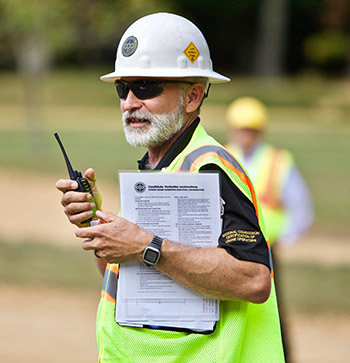September 15, 2022—Following publication of OSHA’s final rule, Cranes and Derricks in Construction, in November 2018, crane operator qualification is generally defined as a three-step process: (1) training, (2) certification, and (3) evaluation.
 Although certification is a necessary component, it cannot account for all the elements that go into making an individual qualified to safely operate a particular crane, in a particular configuration, in a particular working environment, to complete a particular task. Hence the need for proper crane operator evaluations in addition to certification.
Although certification is a necessary component, it cannot account for all the elements that go into making an individual qualified to safely operate a particular crane, in a particular configuration, in a particular working environment, to complete a particular task. Hence the need for proper crane operator evaluations in addition to certification.
Under the Rule, OSHA lays the responsibility squarely on employers to conduct evaluations of operators to ensure they are qualified by a demonstration of both the knowledge and skills necessary to operate specific equipment configurations safely and the ability to recognize and avert associated risks.
In general, evaluations are more directly focused on an operator’s ability to perform assigned work as well as the ability to recognize and avert risk, instead of the general knowledge and skills tested during the certification process. OSHA specifically states that the possession of a certificate (or degree) cannot, by itself, cause a person to be qualified for the purposes of the evaluation.
Evaluator Qualifications
According to OSHA, the required evaluation must be conducted by an individual who has the knowledge, training, and experience necessary to assess equipment operators. Further, the evaluator must be an employee or an “agent” of the employer.
How is the industry largely addressing this requirement? Many organizations have a certified crane operator perform the role of evaluator. However, OSHA has stated “that an individual may have the ability to evaluate an operator without being a certified operator.” OSHA indicated that evaluators may be safety managers or other senior employees with significant experience working around cranes but who might not currently be certified. Others may be specifically trained to evaluate operators.
So how does the employer ensure that their crane operator evaluator meet OSHA’s requirements?
Evaluator Credential
CCO is set to develop a credential for crane operator evaluators that will meet OSHA regulations. By offering this credential, CCO hopes to bring some clarity and uniformity to evaluations, to make evaluations more reliable and defensible, and to establish a “gold standard” for the qualification of crane operator evaluators.
CCO will be the first accredited certification body to offer such a credential. The credential will be available on a nationwide basis.
CCO’s crane operator evaluator credential will be unlike CCO’s other certifications because it will be a “certificate” and not a “certification.”
CCO will seek accreditation of its credential under the ANSI/ASTM E2659-18 standard. An accredited third-party credential from CCO will provide employers with a higher level of confidence in their evaluators’ knowledge and skills because accreditation helps distinguish qualified personnel from those with less-than-quality credentials.
CCO will begin forming its task force in 2023 and anticipates that its Crane Operator Evaluator certificate will be available in early 2024.